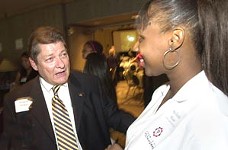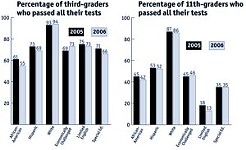Will AISD Crack Down on Special Ed?
Advocates decry district's trend from 'disability' to 'discipline'
By Rachel Proctor May, Fri., Nov. 26, 2004

Austin ISD is a very special place. There are more than 10,000 special-education students in the district – that's 12% of the student body, or about two per classroom. More than half have emotional or learning disabilities, or attention deficit hyperactivity disorder, impairments that can often be confused with bad attitudes or willful misbehavior.
Last week, Congress passed new regulations making it easier than ever before to put special ed students, many of whom theoretically cannot control their behavior, through the same kind of disciplinary procedures as their nonimpaired peers, who can. The move worries special-ed advocates, who fear AISD will take advantage of the new flexibility to get rid of their kids – a practice many say is already widespread.
"The district gets tired of dealing with these kids, so they just throw up their hands," said Lucy Wood, a staff attorney who represents special-ed students in the juvenile justice system for Advocacy Inc. "So instead of trying to figure out the cause of the student's behavior, they figure out a way to send the student into the juvenile justice system."
The regulation in question is the Individuals With Disabilities Education Act or IDEA. The original law, passed in 1997 and reauthorized with tweaks on Friday, said special-ed students cannot be removed from regular classes without an investigation into whether their misbehavior was caused by their disability. In other words, students can't be punished for behaviors they can't control. Not surprisingly, teacher groups have long complained about this policy. "Under IDEA, if a child is violent or disruptive, it's not as easy to have that student removed from class," said John Cole, president of the Texas Federation of Teachers. "But when teachers have to deal with violent, disruptive students, they can't take care of the 21 other students in the class."
Of course, advocates like Wood say schools do remove students, and far too often – for example, by filing assault charges against a freaked-out, flailing, autistic student who hits his teacher. The new version of IDEA requires a "direct and substantial" link be proven between the disability and the behavior to qualify for the discipline exemption. This opens up a lot of leeway for schools to argue that disruptive behavior is not caused by disabilities but by plain old rebelliousness.
Cole, for example, argues that districts are encouraged by state funding guidelines – which grant triple funds for special-ed students – to classify many nondisabled students as special-ed. "Many children are labeled emotionally disturbed who have nothing functionally wrong with their mental capacity. They're just tough customers," said Cole. "But if they're a tough customer, the school doesn't get any extra money. If they're emotionally disturbed, they do." And "tough customers," says Cole, need to be punished, not exempted.
Special education advocates say this attitude is exactly what IDEA protects their children against. Or at least, it's supposed to. Parent Frances Barraza last week pulled her 16-year-old bipolar son out of AISD's Bowie High because she felt the teachers weren't living up to their requirements. Under IDEA, schools are required to develop an Individualized Education Program for each special-ed student, which determines the appropriate grade level at which students can function and the kind of accommodations they need. For example, an ADHD student may be allowed to get up and walk around during class if it helps him concentrate when he returns to his seat. The IEP for Barraza's son called for access to a cool-down room if he became upset or frustrated, but Barraza says her son was simply being kicked out of class and disciplined like a regular student.
Barraza finally gave up; her son will earn his degree through an online program of Cornerstone Christian School in San Antonio. "It was a matter of communication," she said. "The case-folder teacher didn't communicate with the regular teachers. The teachers didn't communicate with me. They just didn't handle the situation well."
While private school is not an option for many parents, advocates say many students end up outside of AISD anyway – through placements in disciplinary alternative education programs. In 2003-04, 27% of students in the district's Alternative Learning Center were special-ed, as were many students in Travis Co.'s Juvenile Justice Alternative Education Program. "It's just easier to criminalize the students' behaviors and get rid of them," said Wood. "It relieves the district of the duty of educating them."
In this light, loosening IDEA seems all the more ominous. Adding an extra layer of concern is the fact that the federal No Child Left Behind Act allows only 1% of a school's students to be tested below grade level, no matter how many special-ed students the school has. This policy exists to keep schools from classifying every hard-to-educate student as special-ed to get around having to test them. But it creates a situation where schools with too many special-ed students can't possibly satisfy NCLB – and therefore probably won't be too upset if they lose some to private school or disciplinary placements.
District officials, of course, say their policy is to emphasize reinforcing positive behavior rather than punishing negative behavior. "Punitive, reactionary discipline isn't good for any child," said AISD director of special education Joan Altobelli. However, the district employs just 10 behavior specialists for its 10,000 special-ed students, so that's clearly an uphill battle.
The coming months will show whether the new regulations funnel more special-ed students out of regular classrooms and into disciplinary settings. And parents and teachers will continue to debate whether the benefits of removing disruptive students from regular classrooms outweigh the costs. But stories like Barraza's show that while schools juggle competing demands of money, tests, classroom discipline, and children's individual needs, some kids will be dropped along the way.
Got something to say on the subject? Send a letter to the editor.










